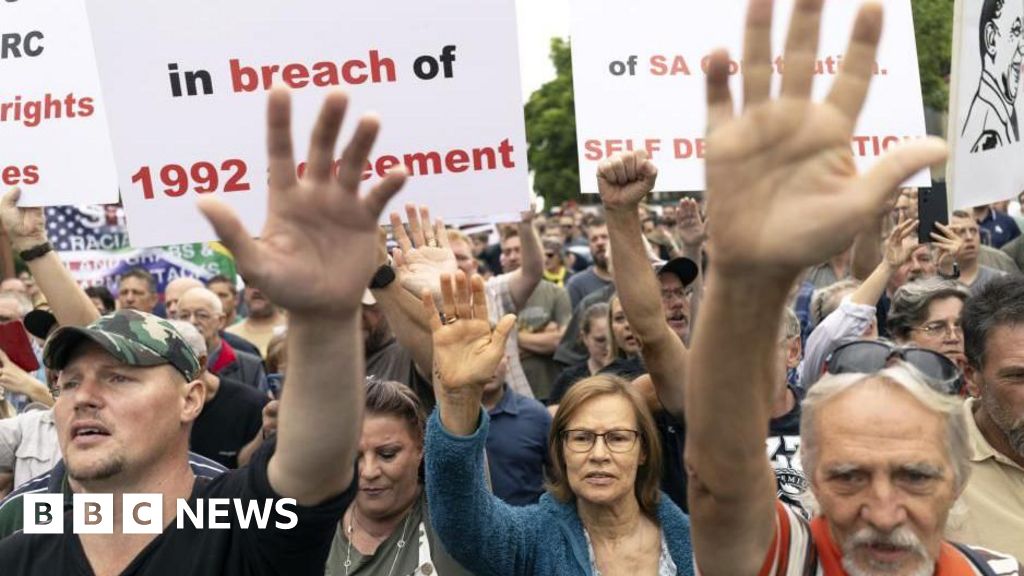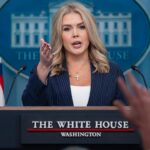A South African court has dismissed claims of a white genocide in the country as “clearly imagined” and “not real” as it blocked a wealthy benefactor’s donation to a racist right-wing group.
The high court recently set aside a $2.1m ( £1.7m) donation Grantland Michael Bray wanted to make to white supremacist group Boerelegioen, ruling it was invalid, vague and “contrary to public policy”.
Bray reportedly wanted to bequeath the amount to the group to help it “further its messages of racial hatred and separation”.
The ruling comes as US President Donald Trump and his adviser Elon Musk accuse South Africa’s government of mistreating the country’s white minority.
Trump referred to the “large-scale killing of farmers” in South Africa, while Musk has condemned what he said were “racist ownership laws” and previously called out the “genocide of white people”.
Despite vowing to crack down on immigration, Trump has said that white South African farmers would be allowed to settle in the US as refugees because of the persecution he said they faced.
Musk was born and grew up in South Africa before moving to the US.
The court action was brought by Mr Gray’s four siblings, who are also trustees and beneficiaries of the family trust.
In it, they claimed that their brother had become “obsessed with the idea of an impending genocide of white people in South Africa” in the last 10 years of his life.
He died in March 2022.
Mr Gray, who was left paralysed following an accident at the age of 26 while doing military service, had also become paranoid as he believed that the supposed “genocide” would occur soon.
“That idea was further fuelled by his already present racism and the online content that he was exposed to,” judge Rosheni Allie summarised in a 15 February ruling that has just come to light.
Mr Gray first met members of the Boerelegioen in 2020 and allegedly gave them about $326,000 (£258,000) in gold coins to help fund their cause and gain membership of the racist group.
The Boerelegioen describes itself as a “civil defence movement that enables citizens to resist the promised slaughter of whites in RSA [Republic of South Africa] as well as the theft of their property.”
He subsequently made the organisation a beneficiary to his estate, specifying that a portion of the money go towards the various training programmes the group ran.
But because there were three entities all bearing the Boerelegioen name, the court found that Mr Gray’s bequest made was “vague concerning which entity was the intended beneficiary” of his will.
“The only expression of the [Mr Gray’s] intention that is evident is the intention for the funds to be used for ‘training’ as well as [his] own assertions that he wanted the funds used to benefit an organisation which he deemed to be one which will exterminate every black person in South Africa’ and will be used to defend or ward off a white genocide, which is clearly imagined and not real,” judge Allie said.
On the public policy issue, Mr Gray’s siblings contended that Boerelegioen wanted to use the funds to “further… its messages of racial hatred and separation”.
They also argued that the group “can’t be allowed to undermine the spirit, purport and objects of the Bill of Rights with impunity and to train a private army with the express purposes of returning to apartheid.”
The Bill of Rights is a chapter in South Africa’s constitution protecting civil rights. It came into effect following the end of the white-minority rule in 1994.
Boerelegioen denied these allegations, claiming they simply provided security and training services to communities and did not exclude anyone on the basis or race, gender or religion.
Judge Allie ruled in favour of the siblings and ordered Boerelegioen to pay the costs in the court case.
Earlier this month, Trump signed an executive order freezing financial aid to the country over a new law allowing for land seizures by the South African government under certain circumstances.
The status of white South African farmers has long been a rallying cry on the right and far-right of American politics.
But despite numerous claims in the past of the systematic targeting of the country’s white Afrikaner minority group, local crime statistics figures paint a different picture.
South Africa does not release crime figures based on race but the latest figures revealed that 6,953 people were murdered in the country between October and December 2024.
Of these, 12 were killed in farm attacks. Of the 12, one was a farmer, while five were farm dwellers and four were employees, who are likely to have been black.
In contrast, 961 women were murdered alongside 273 children.







